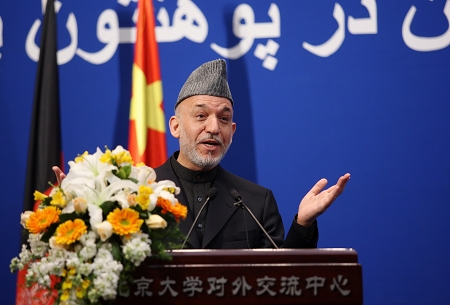
Hamid Karzai, President of the Islamic Republic of Afghanistan, made a speech at PKU on Mar. 25, 2010.
Now, my dearest students, the part of the world where we belong, China and Afghanistan, emerged from a difficult past. Perhaps I can say from a tormented past. Colonilaization and colinial activities in our part of the world, has left us with a very difficult legacy. If that legacy can be, perhaps, described in a few words, we are sturggling to emerge out of underdevelopment. Some of us like China and India have done very, very well in evolving into industrial societies. Some of us are still in serious developmental difficultlies, like Afghanistian. But all of us don’t know each other, one another, as much as we know about the rest of the world. This happens in both China and Afghannistan, where people even don’t know that we are immediate neighbors, sharing a 70-kilometer border, and hundreds years of cultural exchanges. So the colonial legacy has had this unfortunate impact upon us, that we were focused away, away from our own environment into farther, far away environment.
Now China’s rise as a great, great power, as an industrial country, as a great commercial power, as a great educational power is beginning to reshape not only the region, but the world. And that's good news for the Chinese people, but its also good new for the Afghan people and the people around. As we can see, China and Afghanistan are more related to each other, not only in trade and commercial field, but also in educational and cultural field. This shows that we are getting past the difficulties set for us by colonial rules, and getting beyond into the rest of the world and introducing the rest of the world to our region and our region to the rest of the world. The advances that we have are opporunties.
But the opportunties we have are facing challenges. The greatest of the challenges that we face today in this region of the world, other than underdevelopment, other than backwardness, poverty, today, at this juncture of time, is the threat of terrorism, and extremism that I’m sure together we will fight and overcome.
The other problem is the problem of lesser integration in our region. To east Asia, and to Afghanistan, and to central Asia, and to Russia. If you only consider this part of the world, we are not only the most populated part of the world, the most resource part of the world, the youngest part of the world. The youngest, means power for mobility, for movement forward. But have we removed the barriers for this? Do we know each other better? Have we explored the possibilties that we have?
So the first thing for us is to connect with one another by establishing a road linkage. Integration by way of road communcation, service communication is one thing, integration in economic terms is another issue. I was very happy yesterday that President Hu JinTao annouced for us a preferential tariff treatment for some of the Afghan goods to come to China which would indeed not only the Afghan economy, but the integration. Now, with this economics integratiom for the whole region, then we perhaps can also engage in cultural integration and streghthening that integration.
Here, in our part of the world, if countries can pull together, they will not only create a massive movement for our region, but also carry the world along in to more prosperity, in to more togetherness. This is the future that I am hoping for, this is the future that will take us forward into the next centuries, with more comfort, with more economic opportunity, with a better standard of living for all of us.
Now, China—and Chinese role—students, you are in an extremly intersting period of Chinese history, where China is rising very, very fast, and going to be the superpower of the world. You are lucky to be in this period. But it is also upon you morally, that as China is rising, and as you move forward to take the leadership in China, you don't notice that. ou will be the leaders of this country, and by being the leaders of China, you will also have international responsibilites, world responsibilities. My advice to you is, that as you carry on towards that leadership role, that you must remember that there are other people in the world as well who need generosity, who need friendship, who need kindess, who need loving, and the best leadership is a morality driven leadership.
It is this thing that I hope, which is a dream thing right now for me but I hope will be a reality one day in the world, that the nations of the world, especially their governments, will drive their policies from a platform of the interests of all, of the shared interests of all, and not at the cost of the interest of others. My adivce to you, as young people, is to keep this in mind. And this is, I hope, going to be the future of the world, where all of us will live in harmony, in friendship, and togetherness, and the future for Afghanistan and China is definetly this, and I’m pushing hard for this future with China.
We are neighbors, we are door to door, we have a lot to share with each other, and I’m sure that China’s economic prosperity will benefit Afghanistan as well. Like you fill a cup with tea, when you pour too much, it spills over. As the Chinese cup is full now, it's spilling over to us.
Edited by: He Chenlu
Source: Office of International Relations